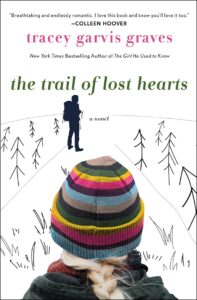
How it feels to be rescued, heard, and loved (Dayton, Ohio and north/south Oregon, present-day): Tracey Garvis Graves doesn’t just write. She writes for us. To make us feel known. Heard.
From the Girl He Used to Know to the girl she becomes, The Trail of Lost Hearts is a “romantic dramedy” about the woman who wants to reclaim the girl she used to be. “A fairy-tale, beautiful and foreboding.”
From the author of Heard it in a Love Song with its playlist of twenty-eight songs, comes Graves’ newest contemporary novel with a smaller playlist yet well-chosen atmospheric, nostalgic, and sexually inviting songs from the 1970s. Lyrics that foretell what’s in store for two lost souls who meet climbing hiking trails surrounded by the “immeasurable beauty” of the Pacific Northwest’s Oregon: “Have You Ever Seen the Rain,” Creedence Clearwater Revival; “Wild Horses,” The Rolling Stones; and “One of These Nights,” by the Eagles.
Embracing the popularity of hiking memoirs as a way of healing in the great outdoors, this fictional story revolves around Wren Waters, thirty-four, who stumbles into thirty-six-year-old Marshall Hendricks on the Wild Iris Ridge Loop in Eugene, Oregon. What’s the odds that would happen when she’s from Dayton, Ohio, he from Portland? That over the past five months they’ve both been emotionally hit by unspeakable losses, unbearable pain, and self-blame? “Healing and grieving are not mutually exclusive.”
What’s also the chance they’d both be into “geocaching”? What’s that you might ask if you’re not into the “world’s largest treasure hunt” that uses a GPS to guide the unearthing of a cache – in this case a capsule hidden on an Oregon trail. Marshall isn’t new to this sport and hobby, Wren is. But they’re both “outdoorsy” people. She’d given that up for an indoors man.
One of the novel’s life messages is: Don’t give up things you love. Find a compromise so you don’t lose part of who you are, and what makes you happy. Balanced. How to judge others to prevent that from happening.
Graves knows how to shape her characters. Wren may have lost the life she thought she had in Ohio, but that doesn’t mean she’s lost her competitive streak. She arrives in Oregon having endured a “deep mental funk” that her persistent BFF, Stephanie, always there for her, pushes Wren out from under the bed covers to begin her healing journey to “Take Back Her Life.” It’s Wren, though, who chooses geocaching on the majestic Oregon trails to “find purpose in the middle of nowhere.” So when Wren is the “FTF, first-to-find” a cache on her first trail she’s thrilled. Among the many emotions she hasn’t felt in a long while.
The cache is also a time capsule since everyone who finds it records their name inside to say we were here too. The prose transports us there too.
Wren and Marshall’s occupations suit the circumstances. Wren creates the content and manages social media accounts for clients, so she can work remotely from anyplace in the world, at a time in her life where the place she’s from holds too many painful memories. Marshall is a psychologist, a perfect set-up since “now is not a great time to let anyone into my brain,” Wren tells us. Giving Marshall a PsyD, Doctor of Psychology, the more modern degree, than a PhD, Doctor of Philosophy, emphasizes Marshall’s desire to save people more directly than the research-focused credential. Both are clinicians, but Graves is good at nuance.
What she’s also a pro at is how to use words to stage sexual tension. Here’s a passage depicting that:
“Looks like I won,” Marshall says when he beats Wren to a cache.
“I guess it does,” she says.
“I guess that means I get to choose my prize,” he tantalizes.
“I guess it does,” she replies, noting “the husking sound of surrender in my voice gives the words a certain tone.”
“Ready to pay up,” he asks, “and now it’s his words that carry a certain tone.”
“Depends on the price,” she says.
“It won’t cost you a thing.”
Of course it will. Letting your guard down, opening up, letting yourself be vulnerable does.
Don’t let your mind get too far ahead of wanting Wren and Marshall to come together. A Tracey Garvis Graves trademark is you will feel-so-good-but-first-you-must-go-through Olympic hurdles. Fitting on the steep and slippery trails they climb.
So expect obstacles to stand in the way. Wren tells us she’s wearing a “spiky armor” and could live happily on an all-female island, yet she also confides she’s “touch-starved” for a man. True to her bitter attitude, she ignores the six-foot, muscular, “good-looking” guy who rescues her from two terrifying men with violent intentions soon after she makes that thrilling cache discovery. How long can she sustain that stance? Meanwhile, Marshall acts like it’s nothing anyone wouldn’t do, but he, she, and we know that’s not true.
Graves is a reader of body language, seen when Wren does notice Marshall’s smile – its “guardedness.” The last thing she can deal with is a man hiding something.
The hero suggests they combine efforts. Continue their one-week hiking/geocaching plans hopping around the state together in Marshall’s Jeep. You can imagine how Wren reacts to the idea of a male “traveling companion.” Since he suggested it, what does that say about the guarded man? Who do you think opens up first? Don’t expect that too soon either.
The novel is a travelogue of sorts. Although Wren resists Marshall’s proposal, she relents accepting she needs him to protect her, physically. The two will hike Crater Lake National Park, “one of the clearest lakes in the world,” stopping at the Phantom Ship Overlook, Pumice Castle, Wizard Island, conjuring the fairy-tale part; Tumalo State Park in Bend, where the “Deschutes River runs through the small high-desert city.” Mount Hood, an ancient national forest, volcanic site, and the tallest peak in Oregon with its iconic snow-capped imagery.


The mention of an island does bring to mind the author’s first novel, On the Island. Except that woman was stranded on an island with a man much younger than her. This time Wren is stranded on an island of her own making, with a man close in age. The two may not be literally stranded, but they share an emotional need to find a way to survive and thrive after what they’ve both gone through. Their raw grief and suffering were triggered by different catastrophes that mentally had a similar effect. Making the point that “healing isn’t always a straightforward and linear process.”
Graves does a service to the stigma of a mental breakdown overcome by tragedy, sadness, anger. Made even more poignant since Marshall is supposed to be an expert on healthy ways to mend one’s psyche. Thus doubling and broadening the novel’s power. This isn’t only a woman’s survival and revival story but a man’s too.
Graves writes as if she’s talking friend-to-friend. One who needs “to be heard,” the other – the reader – who can benefit from what‘s heard.
A story of two kind people learning how to “be kind” to themselves. Will distance make their hearts grow kinder to themselves, when the hiking escape ends? Will Wren and Marshall find a way to get back to each other?
Lorraine
